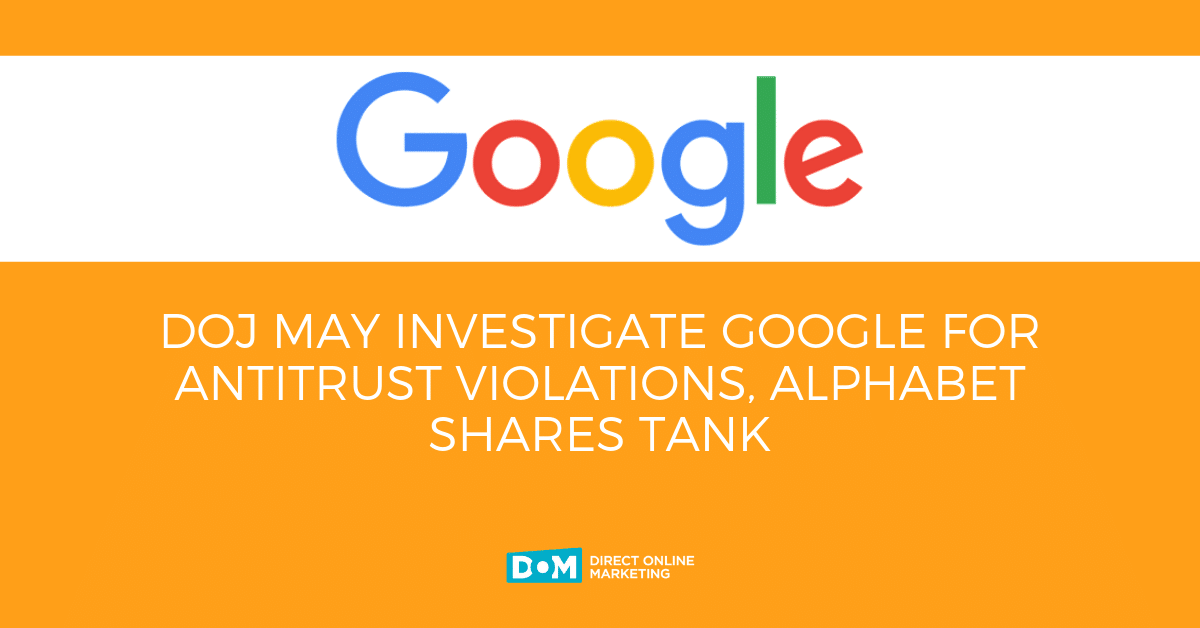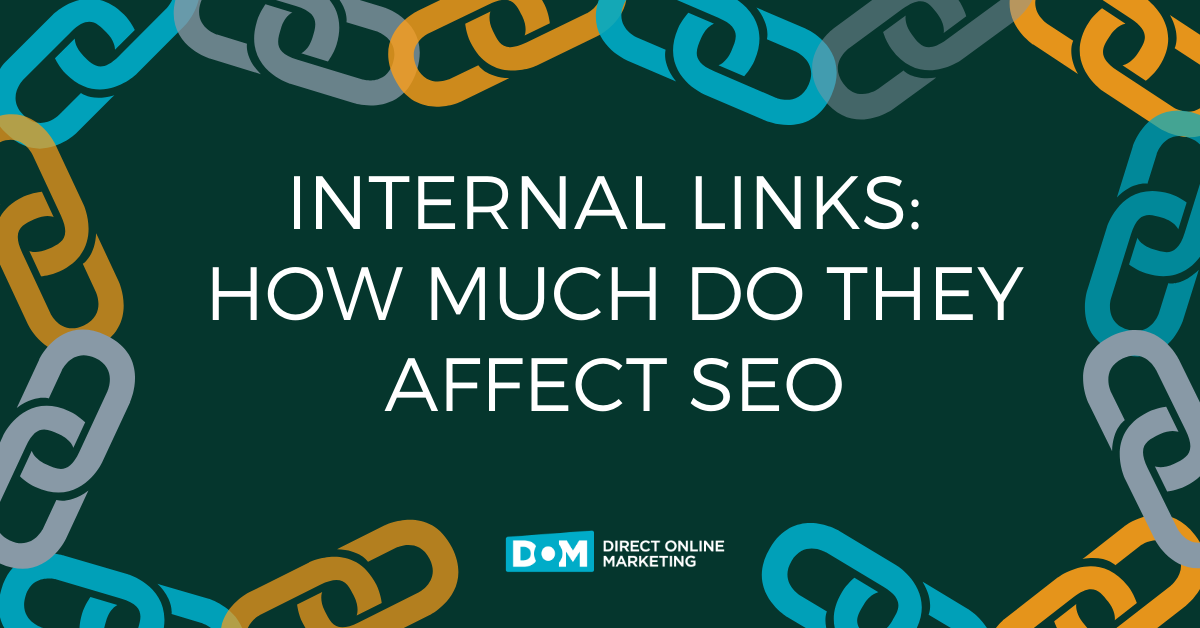
The Department of Justice is preparing to launch an antitrust investigation into Alphabet inc., Google. The news was first reported by the Wall Street Journal over the weekend. The report resulted in Alphabet inc. shares dropping over 6% at the starting bell.
The probe would likely dive into Google’s search advertising practices, but organic search could be a focal point as well.
The report of a potential Google investigation comes at a time when a great deal of public and political debate over big technology superpowers is occurring. Critics of Google’s business practices have been salivating for an investigation for years. Many businesses critical of Google, including some in it’s Silicon Valley home, have made formal reports regarding perceived indiscretions.
Evercore ISI analyst Kevin Rippey told CNBC news that the news is likely to harm Google’s investors. Rippey’s rhetoric is playing out this morning as Google/Alphabet shares continue to dive.
“The investigation comes at a time when the stock’s bull case is challenged by concerns of an abrupt revenue slowdown last quarter,” Rippey wrote. “GOOGL has successfully navigated an antitrust investigation before (2011-2013), and emerged unscathed after a two year inquiry, as the FTC voted 5-0 not to pursue further action. That said, Android and the Play Store have not been pressure tested in a precedent US-led investigation, adding to the complexity of assessing the spectrum of outcomes.”
“While precedent suggests that Google enjoys broad discretion over the direction of search results, the questions arising from an investigation will challenge the possibility of multiple expansion,” he continued.
For Google, Anti-Trust News Is Bad On Both Sides of Aisle
Thinking Google need only hope for a significant political shift in 2020 may prove shortsighted. Criticism of Google’s business practices is strongly bipartisan.
Back in March, Democratic Presidential candidate, Sen. Elizabeth Warren, released a plan that breaks up Amazon, Google, and Facebook. Another Democratic Presidential frontrunner, Sen. Cory Booker, said he supports investigating big tech companies, Google included.
For Google, the current administration has been signaling potential antitrust scrutiny for months.
“I don’t think big is necessarily bad, but I think a lot of people wonder how such huge behemoths that now exist in Silicon Valley have taken shape under the nose of the antitrust enforcers,” current U.S. attorney general Bill Barr said during his confirmation hearing.
The DOJ’s chief antitrust enforcer, Makan Delrahim, represented Google during a merger nearly ten years ago. But last year, he said during a speech “if there is clear evidence of harm to competition in digital platforms, enforcers must take vigorous action and seek remedies that protect American consumers.”
In other words, Google and other big tech companies are unlikely to find any relief in political scrutiny anytime soon.
Once Friends, Some Silicon Valley Executives Turning Foes
Stephen Kaufer, chief executive of TripAdvisor, said his company welcomes an investigation into Google’s business practices. Kaufer told Skift in a statement that his company is concerned over Google’s domination both in the U.S. and abroad.
“TripAdvisor remains concerned about Google’s practices in the U.S., the EU, and throughout the world. For the good of consumers and competition on the internet, we welcome any renewed interest by U.S. regulators into Google’s anticompetitive behavior.”
Grayson Kemper, Senior Content Developer and Marketer for Clutch.com, says that Kaufer is probably particularly interested in having an anti-trust investigation look into maps and answer boxes.
“It will be interesting to see how these developments impact organic search. Google has increasingly featured their content at the top of organic results through 3-packs, maps, answer boxes, knowledge graphs, etc, which obviously has the effect of moving non-Google organic results further down on the page. This seems to be an area that some parties (e.g., TripAdvisor) are interested in having anti-trust regulators review.” Kemper told Directom.com. You can follow Grayson on LinkedIN.
And this isn’t Kaufer’s first rodeo in speaking out against Google. In 2016, he tweeted regarding the web search giant’s “above the fold” tactics.
If Google would just let users search the web instead of foisting their content upon us… https://t.co/RuoaFLh3I0
— stephen kaufer (@kaufer) August 5, 2016
Last February, DuckDuckGo announced it broke the 1 billion searches mark. The news signaled a trend in growing public discontent over another issue big tech is experiencing, which is privacy. Facebook CEO Mark Zuckerberg spent hours and days in a clumsily-ran Senate hearing regarding Facebook’s consumer privacy.
Zuckerberg also strongly pushed back on Facebook being an antitrust violater. The 34-year-old billionaire Facebook founder said that there is plenty of competition in the social media space.
“Whether it’s iMessage for those of you in the US, or Snapchat, or YouTube or Twitter or TikTok, or any of those different folks, the average person here I think uses seven or eight different services to communicate in different kinds of context,” Zuckerberg said. “So I think it almost goes without saying that we live in a very competitive and dynamic environment where these services are constantly coming up.”
But critics of Facebook claim the company merely buys up smaller competition as a way to thwart potential large-scale competition. For example, in 2013, Facebook purchased Whatsapp for $19 billion. Today, Facebook wants its Messenger service to be the primary feed for it’s social media platform, making the 2013 purchase seem reasonably proactive.
Europe is no safe harbor, either
The European Union antitrust watchdog group has already levied billions of dollars in fines against Google. In March alone, Google incurred €1.5 billion in fines from the group. EU antitrust commissioner Margrethe Vestager accused Google of “abusing it’s dominant position” in search. Last year, the EU fined Google €4.3 billion. The year before that, the EU fined them €2.4 billion.
If you are sensing a trend, you aren’t alone. And shareholders are clearly reacting by selling off Alphabet shares.
Big Tech Now In Precarious Position
A U.S. Department of Justice investigation into Google’s compliance, or non-compliance with antitrust laws, could cause chaos across a wide spectrum of big tech companies. Amazon, Google, Facebook, and Twitter, have enjoyed semi-carte blanche existence. That is, until now.
History is our best teacher in terms of predicting what happens next. Back in 2013, the U.S. Federal Trade Commission opened an antitrust investigation into Google’s business practices. The FTC was concerned that Google’s business practices unfairly inflate advertising prices for marketers. To resolve, Google agreed to voluntarily change some of its practices.
This latest investigation won’t be nearly as easy to resolve. However, Google is likely to attempt to make a similar deal in order to avoid a chaotic and messy investigation. If such an investigation were to play out, Google’s stock prices would exist in perpetual turmoil until investors can feel safe again. Amazon’s shares dropped nearly 3% this morning on the news it could be included in an investigation. Amazon is currently embarking on a major shift to ad revenue, so this weekend’s news is far from convenient.
Whatever the case, all of Silicon Valley is on notice. For some smaller companies looking to gain marketshare in search, the investigation news is likely welcomed. For big tech, the same can’t be said.
It’s difficult to determine what this might mean for advertising marketers. However, one might assume that a break up of Google could lead to reduced advertising spends. If this were to be the case, digital marketers would find cause for celebration. However, the interim instability will likely bring about an unsettled period of time.


